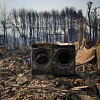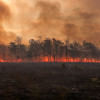Preparing for the future
That Bangladesh would be among the worst hit countries in the world for climate change has been a severe cause for concern for environmentalists and policymakers in the country. Although over the years Bangladesh has taken commendable steps to mitigate the possible effects of climate change, a recent UN report launched ahead of the UN Climate Change Conference in Paris reminds us that there is no place for complacency given Bangladesh's acute vulnerability. The report states that on average 7.2 million people in Bangladesh would be affected by flooding as a result of sea level rise between 2070 and 2100, and 20.3 million people will be living in areas at high risk of cyclone by 2050.
With global warming, the probability of sickness, malnutrition and death from the resulting heat waves, intense storms, and floods increases, further exposing already vulnerable populations such as the elderly, children, the chronically ill and socially isolated people. It is expected that heat-related deaths would rise to 30 per lakh in 2080 compared to four per lakh in Bangladesh between 1961 and 1990.
If we are to escape these bleak probabilities, we must act now to decrease emissions, which includes pressurising countries with high emission levels to commit to cutting down on their carbon footprint during the Climate Change conference. We must also take appropriate adaptation measures such as constructing dikes to lessen the impact of climate change. In addition, as per the WHO recommendation, we ought to have a national policy in place to deal with the health problems associated with climate change and build climate-resilient health-centres in coastal areas.

 For all latest news, follow The Daily Star's Google News channel.
For all latest news, follow The Daily Star's Google News channel. 








Comments